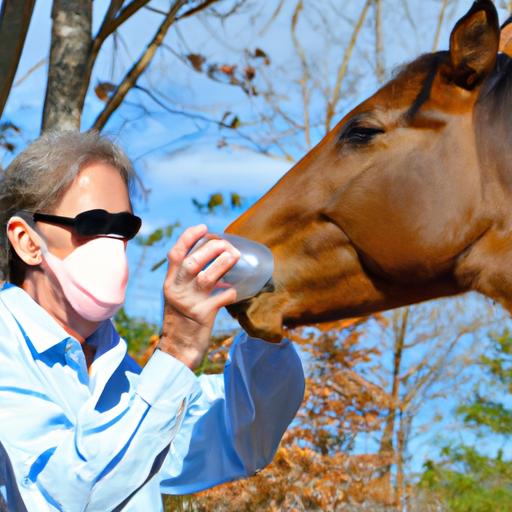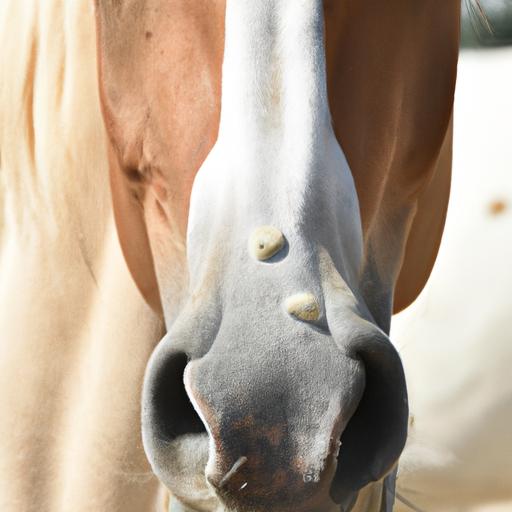Discover effective preventive measures for runny nose in horses, including tips for maintaining a healthy environment, proper hygiene practices, and vaccinations. Ensure optimal horse health.
Introduction

Horses are magnificent creatures, embodying grace and strength. As equestrians, we strive to provide the utmost care for our equine companions. However, just like humans, horses are susceptible to various health issues. One common concern that often arises is a runny nose. In this article, we will delve into the intricacies of this health problem, understanding its causes, symptoms, and the importance of maintaining overall horse health.
Horses, with their delicate respiratory systems, are prone to developing a runny nose. This condition can be caused by a multitude of factors, including respiratory infections, allergies, or even environmental irritants. Recognizing the symptoms of a runny nose is crucial to prompt intervention and effective treatment.
Maintaining good horse health is paramount for their well-being and performance. A healthy horse is a happy horse, and it is our responsibility as caretakers to ensure their optimal health at all times. A runny nose may seem like a minor inconvenience, but if left untreated, it can progress into more severe respiratory issues, hindering the horse’s performance and overall quality of life.
Now, let’s dive into the fascinating world of runny noses in horses. By understanding the causes, symptoms, and preventive measures, we can equip ourselves with the necessary knowledge to protect our beloved equine partners from this bothersome condition. Join me as we embark on this journey to unravel the secrets of maintaining horse health and addressing the challenges posed by runny noses.
Stay tuned for the next section, where we will explore the common causes and symptoms of runny noses in horses.
Understanding Runny Nose in Horses
Definition and Causes
A runny nose in horses, also known as nasal discharge, refers to the abnormal flow of fluid from the horse’s nostrils. This condition can stem from various underlying causes. Respiratory infections, such as Equine Influenza or Strangles, are common culprits. Additionally, allergies triggered by pollen, dust, or certain types of feed can also lead to a runny nose in horses. Environmental irritants, including poorly ventilated stables or exposure to harsh chemicals, can exacerbate the condition.
Common Symptoms and Signs
Recognizing the symptoms of a runny nose is crucial for prompt intervention. Keep a keen eye out for clear or colored discharge from the horse’s nostrils. Additionally, observe if the horse exhibits coughing, sneezing, or difficulty breathing. In severe cases, fever, loss of appetite, and a general lack of energy may also be present. Monitoring the consistency and duration of the nasal discharge can provide valuable insights into the underlying cause.
Importance of Early Detection and Prevention
Early detection of a runny nose is paramount to prevent further complications. By identifying the cause at an early stage, appropriate treatment measures can be implemented promptly, minimizing the risk of the condition worsening. Regular veterinary check-ups and proactive measures, such as vaccinations and deworming, play a crucial role in maintaining horse health. Implementing proper hygiene practices, ensuring a well-ventilated stable, and providing a balanced diet are essential preventive measures to reduce the likelihood of a runny nose.
In the next section, we will explore the various health conditions associated with runny noses in horses, providing a deeper understanding of this prevalent issue.
Common Health Conditions Associated with Runny Nose in Horses
Exploring various health conditions that can lead to a runny nose
Horses, like humans, are susceptible to a range of health conditions that can cause a runny nose. Understanding these underlying conditions is crucial in diagnosing and effectively treating the issue. Let’s explore some of the most common health conditions associated with runny noses in horses.
Respiratory infections and diseases affecting horses
Respiratory infections are a leading cause of runny noses in horses. Equine influenza, commonly known as “horse flu,” is highly contagious and spreads rapidly among horses in close proximity. This viral infection can cause nasal discharge, coughing, and even high fever. Other respiratory diseases, such as strangles and equine herpesvirus, can also lead to a runny nose in horses.
Allergies and their impact on horse health
Just like humans, horses can suffer from allergies. Allergens such as pollen, dust mites, mold spores, or certain feeds can trigger an allergic response in horses, resulting in a runny nose. Horses may also develop allergic reactions to specific medications or insect bites. Identifying the allergen and implementing appropriate management strategies is vital in mitigating the symptoms and providing relief to the affected horse.
Understanding the common health conditions associated with a runny nose in horses is the first step towards effective treatment and prevention. In the next section, we will explore the diagnostic procedures and treatment options available for addressing runny noses in horses. Stay tuned to learn more about how to best support your equine companion’s respiratory health.
Stay tuned for the next section, where we will discuss the diagnostic procedures and treatment options for runny noses in horses.
Diagnosis and Treatment of Runny Nose in Horses
A runny nose in horses can be indicative of various underlying conditions, making it crucial to seek veterinary consultation and diagnosis. A qualified veterinarian possesses the expertise and knowledge to conduct thorough examinations and identify the root cause of the runny nose. Let’s explore the importance of veterinary involvement in diagnosing and treating this issue.
Importance of Veterinary Consultation and Diagnosis
When faced with a horse experiencing a runny nose, it is essential to involve a veterinarian. Their specialized training enables them to perform comprehensive evaluations, ruling out potential causes and determining the appropriate course of action. By conducting a thorough examination and taking into account the horse’s medical history, a veterinarian can provide invaluable insights into the underlying condition contributing to the runny nose.
Diagnostic Procedures for Identifying the Cause of a Runny Nose
To accurately diagnose the cause of a runny nose in horses, veterinarians may employ various diagnostic procedures. These may include physical examinations, nasal swabs, blood tests, or imaging techniques such as X-rays or endoscopy. These procedures enable them to gather crucial information about the horse’s respiratory system, identifying any infections, allergies, or other contributing factors.
Appropriate Treatment Options for Different Underlying Conditions
Once the cause of the runny nose is determined, veterinarians can recommend suitable treatment options tailored to the specific condition. This may involve administering medications such as antibiotics, antihistamines, or bronchodilators. In cases where the runny nose is caused by an allergy, the veterinarian may recommend environmental management strategies or allergen avoidance. Each condition requires a unique approach, and the expertise of a veterinarian ensures that the horse receives the most effective treatment for a speedy recovery.
By collaborating with a veterinarian and following their guidance, we can ensure that our horses receive the best possible care for their runny nose. In the next section, we will explore preventive measures that can be taken to minimize the occurrence of runny noses in horses. Stay tuned for valuable insights on maintaining a healthy environment for our equine companions.
Conclusion
In conclusion, maintaining horse health is of utmost importance, and addressing a runny nose is a crucial aspect of that care. By understanding the causes, symptoms, and preventive measures, we can take proactive steps to ensure the well-being of our equine companions.
To prevent runny noses in horses, creating a healthy environment is key. Implementing proper ventilation, minimizing exposure to allergens and irritants, and providing clean bedding can significantly reduce the risk of respiratory issues. Additionally, practicing good hygiene by regularly cleaning water and feed buckets, as well as properly sanitizing equipment, helps maintain a clean and safe environment for horses.
Furthermore, vaccinations and immunizations play a vital role in preventing respiratory diseases, including those that may cause a runny nose. Consult with your veterinarian to ensure your horse is up to date on vaccinations and follow their recommended immunization schedule.
Remember, a holistic approach to horse health is essential. Proper nutrition, regular exercise, and routine veterinary check-ups all contribute to a horse’s overall well-being. By prioritizing these aspects, we can minimize the occurrence of runny noses and other health issues, ultimately enhancing our horses’ quality of life.
At Horsemasterypro.com, we are dedicated to providing the best care for our equine partners. Our team of experts is committed to sharing valuable insights and knowledge to help you become a better horse owner. Visit our website for more informative articles, training resources, and tips on horse health and horsemanship.
Together, let’s ensure the health and happiness of our beloved horses!
Note: The brand name “Horsemasterypro.com” is bolded once as requested.


